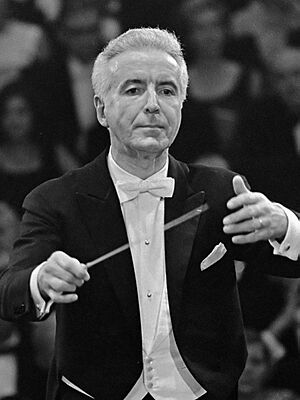Jean Fournet facts for kids
Jean Fournet (born April 14, 1913 – died November 3, 2008) was a famous French flautist and conductor. He was known for his long career and his gentle, precise conducting style. He led many orchestras around the world and helped share French music with audiences everywhere.
Contents
Early Life and Musical Training
Jean Fournet was born in Rouen, France, in 1913. His father was a flautist, which means he played the flute. He taught young Jean how to play the flute and understand music theory.
Jean then went to the famous Conservatoire de Paris. There, he learned more about the flute from great teachers like Gaston Blanquart and Marcel Moyse. He also studied conducting with Philippe Gaubert, who was also a flautist. By the age of 15, Jean was already performing on the flute with the Orchestra of the Théâtre des Arts in Rouen.
Becoming a Conductor
Jean Fournet first became known as a conductor in his home country. He led orchestras in Rouen from 1936 to 1940. Then, he moved to Marseilles, where he conducted from 1940 to 1944. After that, he became the director of the Paris Opéra-Comique from 1944 to 1957.
During these years, he also taught music. He was a professor of conducting at the École Normale de Musique de Paris from 1944 to 1962. He also worked as a guest conductor with the Radio Éireann Symphony Orchestra in Ireland in 1949 and 1950.
An International Career
Jean Fournet's career soon became very international. In 1950, he made his first appearance with the Concertgebouw Orchestra in the Netherlands. The Netherlands became like a second home to him. From 1961 to 1968, he was the main guest conductor of the Netherlands Radio Philharmonic Orchestra in Hilversum. He also taught conducting there. He later married Miriam-Hannecart Jakes, an American musician who played the Cor anglais with the same orchestra.
He continued to lead many important orchestras. He was the music director of the Rotterdam Philharmonic Orchestra from 1968 to 1973. Then, he led the new Orchestre National de l’Île de France from 1973 to 1982. From 1983 to 1986, he was the conductor of the Tokyo Metropolitan Symphony Orchestra in Japan. They even gave him the special title of Honorary Conductor.
Jean Fournet also conducted in America. His first time with the Lyric Opera of Chicago was in 1965. He led two famous works: Carmina Burana and L'heure espagnole. In 1987, he made his debut at the Metropolitan Opera in New York. There, he conducted the opera Samson et Dalila.
For many years, he was also the head of the judging panel for the Besançon International Conductor's Competition. This competition helps find new talented conductors.
A Gentle Perfectionist
Jean Fournet was known for his special conducting style. He was a "gentle perfectionist." This means he always wanted things to be perfect, but he was kind and rarely raised his voice during rehearsals. He was especially good at performing French symphonic music. His long career showed how much he loved music and how dedicated he was.
His final concert was in January 2005. He was 91 years old and conducted the Tokyo Metropolitan Symphony Orchestra. After this concert, he retired to his home in Weesp, near Hilversum in the Netherlands. He passed away in 2008 at the age of 95.
Recordings
Jean Fournet made many recordings throughout his career. These recordings help people enjoy his performances of famous classical music. Some of the composers whose works he recorded include:
- Hector Berlioz: La damnation de Faust and Grande Messe des Morts
- Claude Debussy: Pelleas et Melisande and Prelude to the Afternoon of a Faun
- Georges Bizet: Les pêcheurs de perles and L'Arlesienne Suites
- Camille Saint-Saëns: Piano Concerto n°5 and Violin Concerto n°3
- Paul Dukas: The Sorcerer's Apprentice and Symphony in C
These recordings allow people to listen to his wonderful interpretations of these pieces even today.
 | Janet Taylor Pickett |
 | Synthia Saint James |
 | Howardena Pindell |
 | Faith Ringgold |


